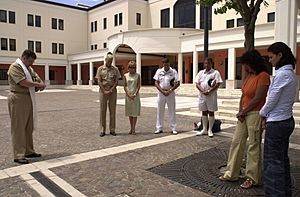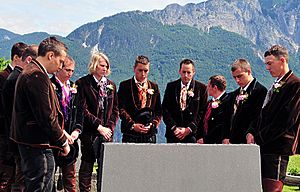Moment of silence

A moment of silence is a short time when people become quiet. During this time, people usually do not make any noise. It is a way to show respect for others, especially those who have died. Many countries use a moment of silence after a sad or difficult event.
Often, a moment of silence lasts for one minute. However, it can be shorter or longer depending on the situation.
On November 11th, many countries observe a two-minute silence. This is to remember people who died in the World Wars. This tradition began in 1919, one year after World War I ended. It became an official part of the yearly service on Armistice Day.
During a moment of silence, people often bow their heads. They might also take off their hats. People usually do not speak or move around. Someone in charge will tell everyone when the quiet time starts and ends. A moment of silence can happen before or after other special events. These events might include the ringing of bells, releasing doves or balloons, or a bugle playing the "Last Post".
Moments of Silence and Government Rules
In the United States, some people discuss how moments of silence fit with the idea of the separation of church and state. This idea means that religion and government should not control each other.
A moment of silence does not have to be for prayer. It can be used for any kind of quiet thought. Many people want time for prayer in public schools or government meetings. They use moments of silence so some people can pray, while others do not have to. The government cannot force people to do religious things. This is because of the Constitution of the United States.
During a moment of silence in public schools, students of different beliefs can do different things.
- Buddhist students might meditate (relax and think calm thoughts).
- Students with other religions like Christianity, Islam, or Judaism could pray.
- Atheist students might think about their day ahead.
Colin Powell, a well-known government leader, supports moments of silence in schools. He has said that a simple moment of silence at the start of each school day is a good idea. He believes students can use this time to pray, meditate, think, or study.
Many people think prayer is not allowed in United States public schools. But this is not completely true. The Supreme Court decided in 1962 that students can pray in school. However, teachers or school leaders cannot lead these prayers. Students can form clubs where they pray. They can also pray by themselves. But they cannot lead prayers at school events. This rule is because of the First Amendment. This amendment says the government cannot force people to do religious things. Public schools are part of the government.
Laws About Moments of Silence
In 1976, the state of Virginia allowed schools to have a one-minute moment of silence. This would happen at the start of the school day. In 1985, the Supreme Court said that a "moment of silence" law in Alabama was not allowed by the United States Constitution.
In 2005, the state of Indiana made a law. It said all public schools had to give students time for the Pledge of Allegiance and a moment of silence every day.
In April 2000, Virginia changed its law. It said that all public schools in Virginia had to have a moment of silence. Before this, schools could choose not to have one. In October 2000, a judge named Claude M. Hilton said that Virginia's "moment of silence" law was allowed by the Constitution.
Judge Hilton said the law had a secular (not religious) purpose. He also said the law did not make religion more or less important. He believed it did not make government and religion too close. Judge Hilton also stated, "Students may think as they wish." This thinking could be religious or not religious. He said the only thing students had to do was sit and be quiet.
In March 2008, Illinois also made a law for a required 30-second moment of silence. However, this law was removed in August of the same year.
The American Civil Liberties Union (ACLU) thinks these laws are not a good idea. They believe the laws are made to give students time to pray. The ACLU feels this makes religion seem more important than non-religious beliefs.
See also
 In Spanish: Minuto de silencio para niños
In Spanish: Minuto de silencio para niños


